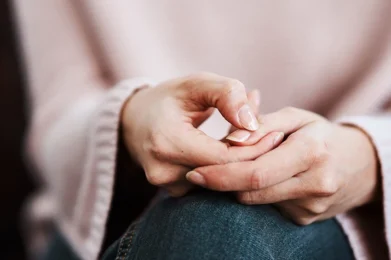In This Article:
- Many people have experienced worsened mental health symptoms due to COVID-19. Pay attention to signs like sadness, difficulty sleeping, irritability, eating habits, exhaustion and lack of motivation.
- Strike a balance between keeping a steady routine of exercise or other activities. Try mixing things up (for example, trying a new hobby or recipe) to avoid getting bored.
- There is no shame in reaching out and asking for help, so don’t hesitate. Many resources and therapists are available online or over the phone, and you don’t have to struggle alone.
Mental health during quarantine
Even though we’ve been adjusting to social distancing orders for more than 6 months now, many are still feeling loneliness during quarantine and struggling with the negative impacts of this isolation. If you’re still having a hard time managing your mental health during this time, you’re not alone – in fact, 55% of people say this season of social distancing has negatively impacted their mental health.
According to Very Well Mind, there are three major factors contributing to these surges in mental health concerns: lack of autonomy, feelings of incompetency and decreased connectedness. Many of us are feeling like we no longer have control over our normal schedules, activities or routines due to this pandemic, and on top of that, we are not able to connect with our social circles as frequently or closely as we would like to.
Now that schools are reopening, many families are either returning to homeschooling or considering their options for sending their kids back to school, both of which are causing additional stress on top of everything else.
As we continue to navigate this difficult time as a community, here are some tips to figure out how to improve your mental health during quarantine and take better care of your mind, body and family through it all.
Pay attention to your symptoms
Now that we’ve been stuck in this routine for months on end, you may be noticing different thoughts and feelings coming up in your mind and body. If you were feeling okay during the first couple of months of quarantine and are now starting to feel unwell, that’s okay – it’s normal for our mental health to change over time, especially in challenging circumstances like this.
Mental health issues can manifest as physical health concerns, meaning managing your mental health during coronavirus requires careful attention to any changes you may be experiencing. Many people are experiencing symptoms such as sadness, difficulty sleeping, irritability, eating too much or not enough, exhaustion and lack of motivation. If you’re feeling any of these symptoms, don’t be afraid to speak to a trusted loved one about it or reach out for professional support.
Get some sleep
One of the most common issues people of all ages have been reporting during quarantine has been difficulty falling or staying asleep. Now that your daily routines have most likely undergone a drastic change, your body is having to adjust to your new lifestyle. The hormones and brain functions that regulate our sleep cycles are very sensitive to changes in activity, mood and stress levels, so it’s not unusual that so many people are having a hard time sleeping during these stressful, unpredictable times.
If you or your kids have fallen out of your regular sleep schedules (e.g. later bedtimes, more frequent naps, sleeping in later, etc.), make an effort to get back on track. Be mindful of ways you can prepare your body for a better night’s sleep and try to establish a strict routine. This will ensure your mind and body are getting the rest they need to keep you happy, alert and energized throughout quarantine.
Keep a routine – or start a new one
In the beginning of this season of quarantine, many experts were strongly recommending people of all ages establish daily routines and stick to them in order to manage their mental health during coronavirus – and that still rings true, especially now that people are going back to school.
A routine can be as simple as going to bed and waking up at the same time every day, getting a morning workout in, scheduling some time for reading or playing games – anything you can do on a daily basis to motivate you and keep you on schedule. If you’re getting bored with the routine you set at the beginning of quarantine, don’t be afraid to mix it up. For example, schedule some time to try a new hobby, do a different workout or start a new weekly tradition with your friends or family.
Mix things up
Spending so much extra time in your home may have you growing bored with your current surroundings. Is there something you can do to redecorate or revitalize your space and make it feel more welcoming, energizing or fun? Even if that just means finding some new houseplants, a few pieces of wall art or repainting a certain room, redoing small things about your space can have a big impact on your mental health and happiness. And don’t forget to keep things clean and organized!
Reframe your thoughts
If you’re feeling overwhelmed by anxiety, negative thoughts and stress, you’re not alone, and these thoughts are very normal. It’s important to accept any feelings that come up and be gentle with yourself as you work through them.
Next time you find yourself overwhelmed with negative thoughts, you may find it helpful to reframe those thoughts from a positive perspective. For example, instead of focusing on how bored you feel staying at home, say, “I’m grateful for how much extra time I have to get things done and do the relaxing activities I enjoy.”
Keeping a list of affirmations, positive reminders or quotes that inspire you can be very helpful and help you feel more motivated when you begin to feel overwhelmed.
Be kind to yourself and to others
Remember, the reason we’re staying inside more, social distancing and wearing masks is to protect ourselves and care for our communities and loved ones. We’re all doing what we can to make the safest, healthiest choices possible for ourselves, especially now that schools are starting back up and certain businesses have reopened.
You may be choosing to homeschool your kids for the rest of the year, and it may concern you if family members or friends are choosing to send their kids back to school. Try to be compassionate and understand that these decisions are very difficult for everyone – continue to care for yourself and your loved ones and make the decisions that feel best for you.
Reach out for help
If you’re having a hard time coping and need additional support, don’t hesitate to reach out and ask for help. There are many resources and therapists available online or over the phone, and you don’t have to struggle alone.
Taking care of your mental health during coronavirus can be tricky, but you don’t have to navigate these times alone. Our behavioral health professionals here at Valleywise Health are here to help you feel your best, no matter what. Call us at 1-833-VLLYWSE or visit ValleywiseHealth.org to book your in-person or telehealth appointment.
Sources:
- https://www.businessinsider.com/millennial-mental-health-coronavirus-pandemic-quarantine-2020-5
- https://www.verywellmind.com/protect-your-mental-health-during-quarantine-4799766
- https://journals.lww.com/neurotodayonline/fulltext/2020/07090/sleep_neurologists_call_it.1.aspx
- https://adaa.org/learn-from-us/from-the-experts/blog-posts/consumer/covid-19-lockdown-guide-how-manage-anxiety-and







